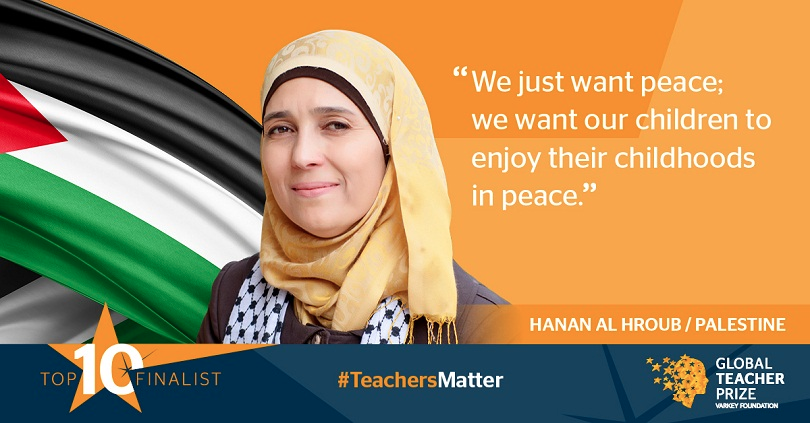
Despite numerous barriers to economic success facing Palestinian women in the West Bank, many are able to benefit from a vital network of individual philanthropists and NGOs aiming to help them. To be effective, such aid networks must understand the current social, political, and economic realities of West Bank Palestinian women, who have the potential to drive wide-reaching changes in their society as a whole. Patriarchal societal norms, inadequate public transportation, and employers’ bias against hiring women may undermine their economic self-determination. Ironically, such domestic and regional setbacks affecting the lives of these women have been discussed in media reports, while grassroots movements and organizations on the ground helping West Bank women are often ignored.
This typical pattern was recently overturned, however, when Hanan al-Hroub was awarded the Global Teacher Prize in March 2016 by Pope Francis. Al-Hroub used her moment of fame to explain to the world that her passion for teaching nonviolence to Palestinian children began when her children were traumatized following an incident involving shooting on their way home from school. As a teacher, she seeks to build a stronger, more peaceful Palestinian society by positively influencing the next generation. However, her success also serves to highlight the challenges that her peers face. Due to internal Palestinian conflicts and the Israeli occupation of the West Bank, many Palestinians have experienced similar traumas. Indeed, girls in the West Bank had a 37.8% rate of psychological morbidity in 2000. This means that a corresponding percentage of these children had behavioral and/or emotional disorders, including PTSD. It is thus important to keep in mind the psychological, not just political or economic, obstacles that Palestinian women in the West Bank face as they seek to build successful, happy lives.
While education and psychological health are prerequisites for success, some NGOs and women’s cooperatives arising in the past couple of decades have sought to empower women economically, as well. Such a group is the Women’s Affairs Technical Committee (WATC), which focuses on equal rights for women in Palestinian society. In 1992, the group was established in Ramallah with the aim of achieving social justice as is outlined by the Palestinian Declaration of Independence, the Palestinian Women’s Rights Bill, and international law. Its strategies are nonviolent and it rejects violence by others. Its accomplishments include its publication of the only monthly newspaper on Palestinian women’s issues and society, it has a weekly radio program, a social media presence, and it partners with other like-minded women’s groups. The group endorses pluralism, secular discourse, and equal application of the law as the means of moving toward greater rights and opportunities for Palestinian women.
The WATC has seen marked progress in its work since its founding, although many problems still persist. One success came in 1995-6 when the WATC successfully protested against the Palestinian National Authority’s (PNA) plan to force Palestinian women to obtain their male guardian’s permission in order to receive a passport. During this movement, the WATC also called for a 30% minimum quota of women in the Palestinian legislative council, which gained support from many candidates. The WATC’s emphasis on increasing the number of women in the Palestinian government should not be understated; without women in power, the glass ceiling that Palestinian women face will remain. Another notable milestone for the WATC came when it successfully lobbied the Civil Administration to legally guarantee Palestinian women three months of maternity leave and a paid hour for nursing their babies. Unfortunately, these laws are not always enforced, but it still marks an important step in the right direction. These changes facilitate women’s abilities to succeed in the workforce and fulfill roles other than motherhood and matrimony. Women wishing to work outside the home require legal and social support to balance motherhood and professional life. Once the existing rules are enforced evenly, Palestinian women can lobby for measures to encourage this balance.
Healthily, there are disagreements among Palestinian women in the West Bank on how best to create a better future for themselves. Pluralistic organizations like the WATC may be unappealing to ultra-pious or Islamist Palestinian women who tend to shun secular values. Feminist NGOs that rely primarily on foreign funding may face domestic delegitimization. To avoid such a stigma, the Ramallah-based WATC accepts funding from foreign sources, as well as from Palestinian donors. The Palestinian Authority and Palestine Liberation Organization each claim to support women’s rights groups (the Ministry of Women’s Affairs and the General Union of Palestinian Women), but such claims are largely symbolic, with few actions to back them up. Moreover, priorities and ideologies also vary between Palestinian women on the basis of socioeconomic status. As Palestinian women gain economic opportunities over time, it is hoped that their voices will form the basis for a growing civil society with growing economic productive potential.








